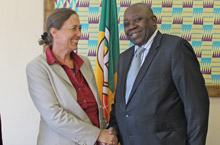Cashew – an opportunity for poverty reduction in ACP countries
 Brussels 20 May 2014/ ACP: The demand for cashew nuts – the popular and nutritious snack and food source – is rising globally. With Africa turning out 1.2 million tons per year, the Africa Cashew Initiative (ACi) has highlighted the notable opportunities of cashew production and growing markets for the ACP Group.
Brussels 20 May 2014/ ACP: The demand for cashew nuts – the popular and nutritious snack and food source – is rising globally. With Africa turning out 1.2 million tons per year, the Africa Cashew Initiative (ACi) has highlighted the notable opportunities of cashew production and growing markets for the ACP Group.
In a presentation to ACP Secretary General H.E Alhaji Muhammad Mumuni and trade and commodity experts at the ACP Secretariat last week, ACi Executive Director Rita Weidinger gave an overview of the untapped prospects in the ACP that could further boost economies and contribute to poverty reduction.
Opportunities in the cashew sector
Africa produces about 45% of global cashew production (1.2 Million tons), however less than 10% undergoes further processing in Africa. 90% of the households growing cashew live below the poverty line and encounter periods of insecure food supply.
Cashew growing is likely to increase in importance, with a continuously growing market demand. Being a tree crop, cashew is perfectly suited to expand its suitability with growing effects of climate change, and even “buffer” its effects on food crops.
Growing cashews helps households to diversify their income and to get through the period of food insecurity. Processing in Africa allows to add annually 2.2. billion Euro and create employment for 275,000 people. The consumption of cashew nuts and cashew apples increases the nutritional health of rural communities as the cashew nut contains vitamins, minerals, and micronutrients and cashew apples are rich in Vitamin C.
Similarly in the Caribbean and Pacific countries cashew can be cultivated on marginal land, with an income opportunity for the rural poor. Dr OPOKU AWUKU assures the ACi team, that he personally witnessed successful cashew growing in Belize.
The African Cashew Initiative
Since 2009 the African Cashew Initiative supported 300,000 farmers in African countries, namely Benin, Burkina Faso, Côte d’Ivoire, Ghana, and Mozambique, thus they could double their income from cashew. This translate to an annual family income of $30 million until 2015; benefitting 2.2 million members of rural households.
The African Cashew initiative constitutes a new type of multi‐stakeholder partnership in development cooperation. The initiative is mainly funded by the German Federal Ministry for Economic Cooperation and Development (BMZ) and the Bill & Melinda Gates Foundation. GIZ, the Deutsche Gesellschaft für Internationale Zusammenarbeit GmbH has been commissioned with the management of the project. ACi especially benefits from the diverse commercial and technical expertise of their private and public sector partners.
Through training of trainers, ACi develops local capacities of highly knowledgeable resource persons as trainers in cashew value chain including policy advice and facilitate regional exchange for learning and innovation. Series of technical trainings were given to 2,200 trainers and 62 master trainers from 7 West African countries, to 300,000 farmers, as well as to management and staff of 20 processing companies.
ACi supported the creation of more than 5,000 jobs in the new cashew processing industry, 75% of which are held by women. Further increases are possible through the processing of by-products especially the cashew apples and shells.
16 Matching fund projects with 30 public and private partners involving a total amount 6 million Euros are targeting an increase of income for 123,000 farmers linked to in-country processing and markets.
Vision and untapped opportunities in the cashew sector
Beyond the current activities, there are further areas to expand the African Cashew production. ACi is designed for 10 years to increase private sector and government funding and donor diversification, targeting 30% of African cashew producers, and increasing the revenue of about 500,000 cashew farmers. Thus it is advised, to continue using successful partnership structures for upscaling activities beyond cashew.
ACi has started preparations to leverage the regional overlap of cashew famers intercropping with groundnuts and other food crops. Engaging cashew processors and national traders to work towards an integrated delivery of extension and postharvest logistics and infrastructure is similarly to be continued. ACi can build on successful pilots by the nut buying company Intersnack and the NGO Fairmatch Support and 3 African based processing companies in improving groundnut quality.
ACP Secretariat committed to develop the cashew commodity sector
The Secretary General thanked the Executive Director of ACi for sharing the encouraging results of their 5-years work, and stressed his commitment to further developing the cashew sector in ACP countries. The multistakeholder and multifunctional approach as demonstrated by the African Cashew Initiative shall be further upscaled within Africa and also extended to Carribean and Pacific countries. Given a secured market access and building in-country transformation, a structured value chain of the product will allow poverty alleviation for more than 1.5 million poor farmers.
(Photo: ACP Secretary General H.E Alhaji Muhammad Mumuni with Executive Director African Cashew Initiative/ GIZ Rita Weidinger. The meeting was also attended by ACi/GIZ Matching Fund Manager Ernest Mintah, ACP Assistant Secretary General Achille Bassilekin III, trade and commodity experts Mr Yao Adingra and Mme Hélène Fiagan, and Acting Chief Legal Counsel Dr Emmanuel Opoku Awuku.)
– Yao Kouman ADINGRA, Expert – Commodities
